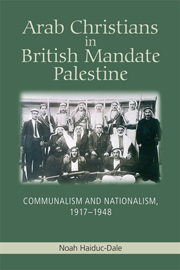Book contents
- Frontmatter
- Contents
- List of Illustrations
- Acknowledgements
- Introduction: Nationalism and Religious Identification
- 1 1917–1923: Balancing Religion and National Unity
- 2 1923–1929: Christians and a Divided National Movement
- 3 1929–1936: Towards Communalism
- 4 1936–1939: Standing Aloof? Arab Christians and the Great Revolt
- 5 1940–1948: National Strength through Communal Unity
- Conclusion: Nationalism and Communal Identification – Conflicting Identities?
- Bibliography
- Index
1 - 1917–1923: Balancing Religion and National Unity
Published online by Cambridge University Press: 05 October 2013
- Frontmatter
- Contents
- List of Illustrations
- Acknowledgements
- Introduction: Nationalism and Religious Identification
- 1 1917–1923: Balancing Religion and National Unity
- 2 1923–1929: Christians and a Divided National Movement
- 3 1929–1936: Towards Communalism
- 4 1936–1939: Standing Aloof? Arab Christians and the Great Revolt
- 5 1940–1948: National Strength through Communal Unity
- Conclusion: Nationalism and Communal Identification – Conflicting Identities?
- Bibliography
- Index
Summary
We the inhabitants of Palestine, 700,000, representing and acting for 800 million Christians and Moslems in this Holy Land, shall [raise] our voice and say: ‘After the blood we have shed and after that which was shed for us, is it permissible for the existing conscience of the world to give our land to a mixture of emigrants, called the Zionists, coming from the five continents of the world and wanting to appropriate our land …? They hardly amount to one eighth of us, we the inhabitants of the land.’
F. Beiruti, on Behalf of the Muslim Christian Association, 25 October 1919Serious difficulty [for British rule] arises from the political division of the community into three sections, based upon religion. If the municipal electoral law paid no regard to these divisions, they would, nevertheless, be found to operate in practice.
Edward Keith-Roach, 14 February 1921In March 1920 ᶜArif al-ᶜ Arif, Arab nationalist leader and editor of the newspaper Suriyah al-Janubiyah (southern Syria), extolled some since-forgotten show of religious unity:
Never in all its later history have Palestine and ancient Jerusalem witnessed so great a day as last Friday. On that day the national feeling swayed Arabs, Christians and Moslems – on that day an end was put to religious strife. These two religions will henceforth live in peace. Until this historic day Europe has not inclined an attentive ear to the words of the Palestinians because they were not united, and did not have the means of making their pleadings known to the European nations and the democratic public.
- Type
- Chapter
- Information
- Arab Christians in British Mandate PalestineCommunalism and Nationalism, 1917-1948, pp. 19 - 60Publisher: Edinburgh University PressPrint publication year: 2013



